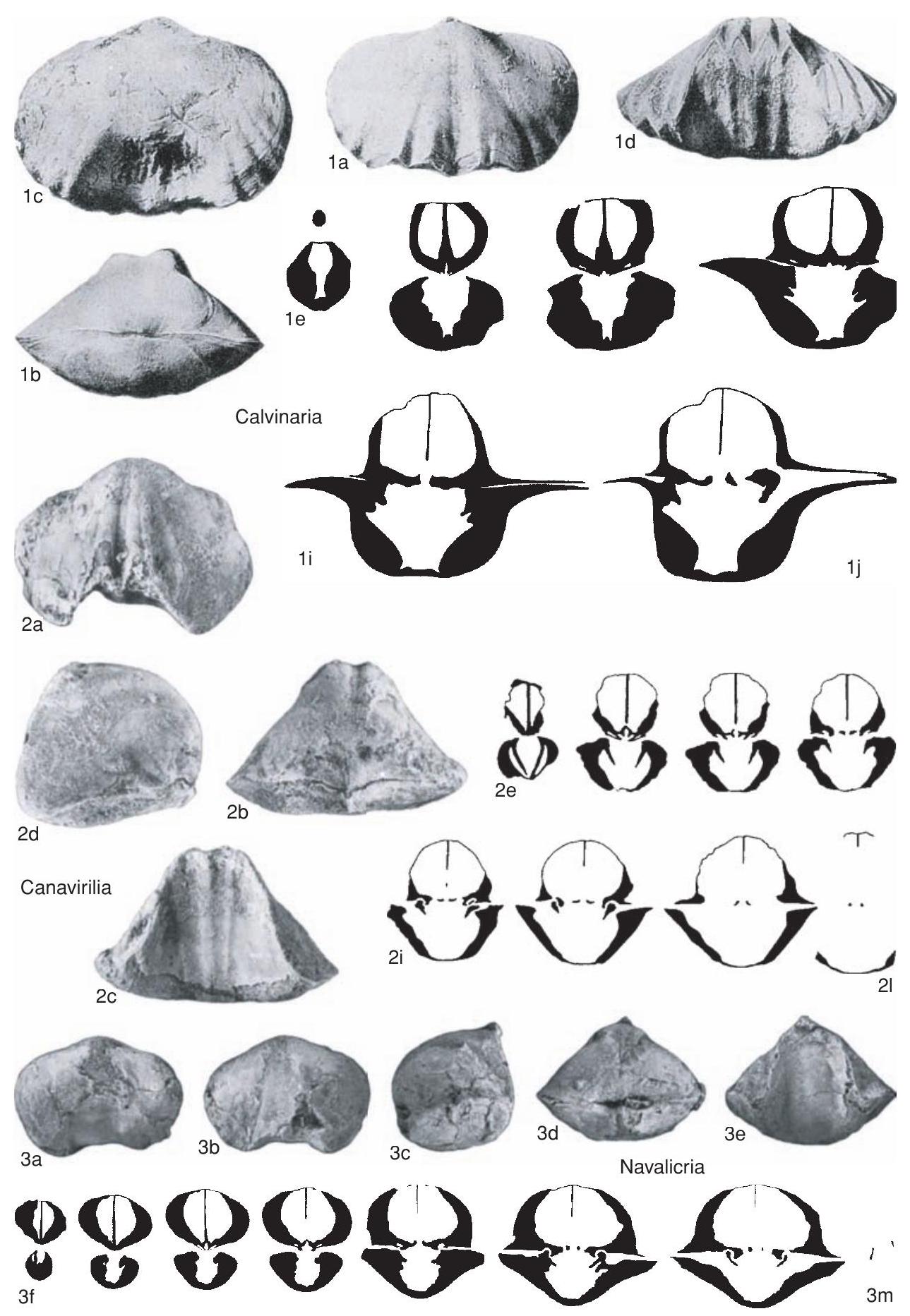Welcome to the Treatise on Invertebrate Paleontology!
Please enter a genera name to retrieve more information.

Calvinaria
Classification
Phylum:
Brachiopoda
Subphylum:
Rhynchonelliformea
Class:
Rhynchonellata
Order:
Rhynchonellida
Superfamily:
Camarotoechioidea
Family:
Leiorhynchidae
Subfamily:
Calvinariinae
Formal Genus Name and Reference:
Calvinaria STAINBROOK, 1945, p. 43
Type Species:
Rhynchonella ambigua CALVIN, 1878, p. 729, OD
Images
(Click to enlarge in a new window)
Fig. 783, 1 a-j. *C. ambigua (Calvin), upper Frasnian, Iowa, USA, a-b, hypotype, dorsal and posterior views, Amana Beds, Amana, x1.2, c, holotype, ventral view, Independence Shale, Independence, d, hypotype, anterior view, Independence Shale, Brandon, x1 (Stainbrook, 1945), e-j, serial sections 2.6, 2.7, 2.95, 3.3, 3.5, 3.8 ~mm from posterior, x2 (Sartenaer, 1955).
Synonyms
Geographic Distribution
North America, Europe, northern Africa, China
Age Range
Beginning Stage in Treatise Usage:
Upper Devonian (Frasnian)
Beginning International Stage:
Frasnian
Fraction Up In Beginning Stage:
0
Beginning Date:
378.9
Ending Stage in Treatise Usage:
Upper Devonian (Frasnian)
Ending International Stage:
Frasnian
Fraction Up In Ending Stage:
100
Ending Date:
371.1
Description
Large with markedly transversely ovate outline, Biconvex profile with lateral and anterior slopes low, Beak incurved, foramen oval, Fold and sulcus strong, arising at umbones, anterior commissure broadly uniplicate, tongue high, trapezoid, serrate, Costae broad, arising near umbones, present on fold, sulcus, and flanks, Dental plates convergent ventrally, often obscured by thick callus, ventral muscle field deeply impressed, Dorsal median septum long, thin, high, septalium short, narrow, hinge plates divided anterior of septalium, crura long, ventrally curved
References
Museum or Author Information
Classification
Phylum:
Brachiopoda
Subphylum:
Rhynchonelliformea
Class:
Rhynchonellata
Order:
Rhynchonellida
Superfamily:
Camarotoechioidea
Family:
Leiorhynchidae
Subfamily:
Calvinariinae
Formal Genus Name and Reference:
Calvinaria STAINBROOK, 1945, p. 43
Type Species:
Rhynchonella ambigua CALVIN, 1878, p. 729, OD
Images
(Click to enlarge in a new window)
Fig. 783, 1 a-j. *C. ambigua (Calvin), upper Frasnian, Iowa, USA, a-b, hypotype, dorsal and posterior views, Amana Beds, Amana, x1.2, c, holotype, ventral view, Independence Shale, Independence, d, hypotype, anterior view, Independence Shale, Brandon, x1 (Stainbrook, 1945), e-j, serial sections 2.6, 2.7, 2.95, 3.3, 3.5, 3.8 ~mm from posterior, x2 (Sartenaer, 1955).
Synonyms
Geographic Distribution
North America, Europe, northern Africa, China
Age Range
Beginning Stage in Treatise Usage:
Upper Devonian (Frasnian)
Beginning International Stage:
Frasnian
Fraction Up In Beginning Stage:
0
Beginning Date:
378.9
Ending Stage in Treatise Usage:
Upper Devonian (Frasnian)
Ending International Stage:
Frasnian
Fraction Up In Ending Stage:
100
Ending Date:
371.1
Description
Large with markedly transversely ovate outline, Biconvex profile with lateral and anterior slopes low, Beak incurved, foramen oval, Fold and sulcus strong, arising at umbones, anterior commissure broadly uniplicate, tongue high, trapezoid, serrate, Costae broad, arising near umbones, present on fold, sulcus, and flanks, Dental plates convergent ventrally, often obscured by thick callus, ventral muscle field deeply impressed, Dorsal median septum long, thin, high, septalium short, narrow, hinge plates divided anterior of septalium, crura long, ventrally curved
